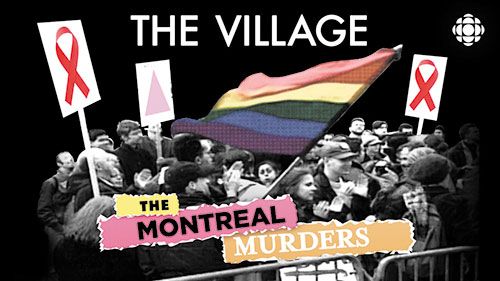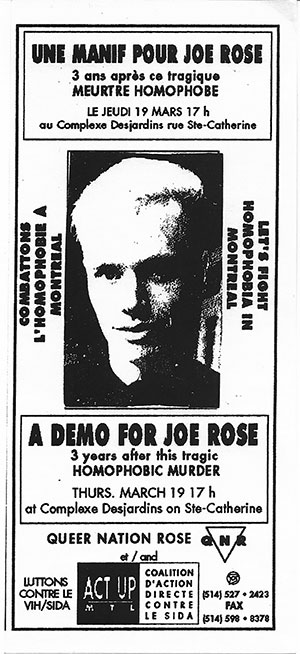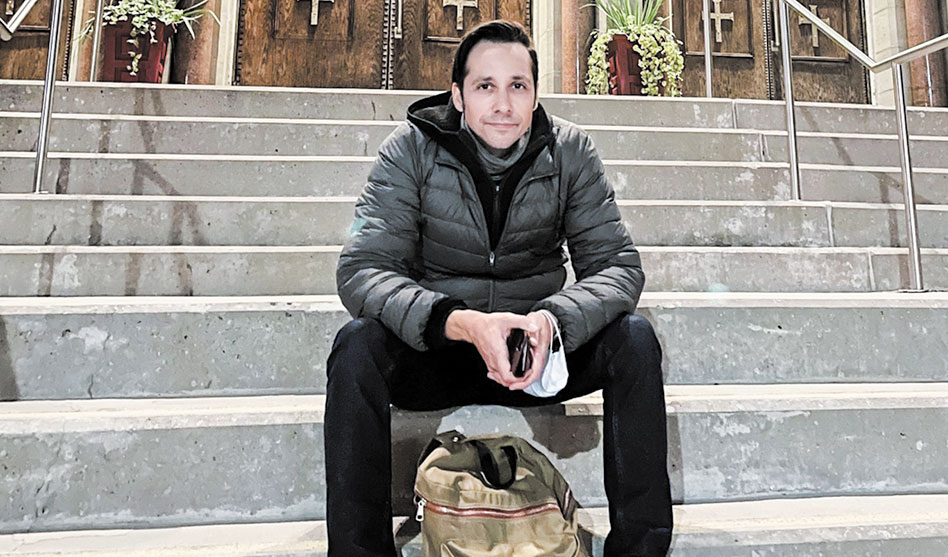Francis Plourde. (Photo courtesy of CBC Media Centre)
Podcast sheds light on forgotten murders of gay men in Montreal
Christiana Lilly | Special Contributor
When you ask about or Google the murders of gay men in Montreal in the 1990s, the answers all lead to the podcast The Village: The Montreal Murders. LGBT advocates encouraged me to listen to the podcast. And in my online research, only a handful of news stories talked about the murders prior to the release of the CBC’s 2022 podcast hosted by gay French Canadian journalist Francis Plourde.
 “Since the podcast was released, I got quite a few people who lived in Montreal and were in their early 20s when all that happened, and many of them had no idea this was happening,” Plourde said. “That’s how segregated things were in Montreal.”
“Since the podcast was released, I got quite a few people who lived in Montreal and were in their early 20s when all that happened, and many of them had no idea this was happening,” Plourde said. “That’s how segregated things were in Montreal.”
Over seven episodes, the third season of The Village investigates the murders of 18 gay men in Montreal at the height of the HIV/AIDS crisis, starting with the murder of 23-year-old gay activist Joe Rose in March 1989.
Rose was known for his pink hair, his “Silence = Death” pin and his snappy comebacks. A friend told Plourde that Rose once said, “If you can’t stand the fruits, get out of the orchard.”
Rose was diagnosed with AIDS at age 19 after donating blood. But he never hid his status, and his goal was to start a chapter of ACT UP (AIDS Coalition to Unleash Power) in Montreal.
Sadly, he never got that chance.
Rose was riding a bus home to the HIV/AIDS hospice where he was living when four teens started yelling homophobic slurs at him. Then they attacked beating him before stabbing him to death. The oldest of the group, a 19-year-old named Patrick Moise, was convicted but sentenced to a mere seven years in prison.

A-flier-promoting-a-rally-to-commemorate-the-three-year-anniversary-of-Joe-Rose’s-murder.-(Photo-courtesy-AIDS-Activist-History-Project)
Many blamed gang violence because the teens were Black. Others blamed a lack of bus safety. But the LGBTQ community stood up and said what no one wanted to hear: Homophobia killed Joe Rose.
The LGBTQ community in Montreal and beyond rallied for justice for Rose. But his murder was, unfortunately, the only one. The same night Rose was killed, 28-year-old Richard Gallant was found stabbed to death in his home in The Village. That was the start. A total 16 other gay men were murdered in Montreal between 1989 and 1993.
South Florida Gay News had the chance to talk to Plourde about making The Village: The Montreal Murders and bringing to light a piece of Canada’s LGBTQ history. Here is that interview:
SFGN: This season doesn’t have a single “villain.” How did that complicate things? Francis Plourde: For a long time, there were fears that there was a serial killer in Montreal, in the late 1980s, early ’90s. Turns out there was one, but that was not the only reason why gay men were dying in The Village in Montreal. So, it was a bit of a challenge in terms of, like, so many of those cases were different and in terms of how they happened, the background of the individuals. There were things in common, but there were also big, big differences as well.
So, in this case it was a challenge, yes, for research and for storytelling. But at the same time, we wanted to do something a bit different with that season. We wanted to look at the broader context of Montreal and what it was to be queer in Montreal in the early ’90s. So the series became focused on those crimes that happened in Montreal, yes, but it was also about the AIDS crisis that was happening at the same time, which was kind of fueling the homophobia that we saw in Montreal in those days. And we wanted to show that it was also a story about the empowerment of a community, a community rising together.
What response did you get from sources 30 years later? On one hand, there was this eagerness to share their story because they knew it was important for so many reasons. But it was also challenging … . We also met people who were not willing to engage or to do interviews with us because they lost a loved one. In many cases, the murder is still unsolved. And there was this double pain, the loss of an individual, but also the context — in some cases people had double lives; they were not disclosing their sexual orientation to their family, right?
And memories can change decades later. Yeah, that’s the challenge with interviewing people who will remember things from 30 years ago. If you ask anyone what they did last week or a month ago, often they won’t even remember accurately. Imagine 30 years. But I was still surprised by how much people remember, and I think that’s because it was so impactful. In their life, it had so much impact. So, I think that’s why they had such vibrant memories of what happened.
I couldn’t help but notice the parallel between the attacks on gay men, who were blamed for the HIV/AIDS crisis, and the anti-Asian hate we’ve seen during the COVID pandemic. Was that something that struck you? Oh, yes, that was so obvious. It was so obvious to me because I live in Vancouver, and there’s a big Asian community there, and I was seeing the same thing in the early days of COVID. I mean, so little was known about the disease.
There was this perception that it came from Asia, and, as such, people were targeting Asian people, trying to avoid Asian markets.
When [Rose] was attacked on the bus, a friend was with him, and the first thing he told first responders was that [Rose] had AIDS so they would take precautions … . There were so many wrong ideas about protections for the disease, like you avoid The Village, you don’t touch gay people — all those those kinds of like misconceptions. It kind of fueled the homophobia that we noticed in Montreal and elsewhere as well; I don’t think that was specific to Montreal, but, yeah, it was kind of impossible not to make the connection.
Christiana Lilly is an award-winning journalist whose work ranges from lifestyle and community reporting to hard-hitting investigative pieces. She has been recognized by the Society of Professional Journalists Florida chapter, Florida Press Club and Florida Magazine Association. She lives in Pompano Beach with her husband and their pup.

